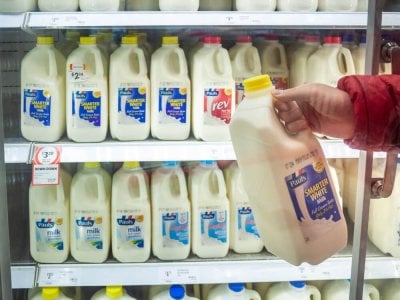Major dairy company hit with hefty $950k fine for code of conduct breach
- Replies 7
The big multinationals may have a lot of money and power, but there’s a limit to how much they can get away with—and when they cross a certain line, the authorities will step in.
Recently, one of the country's most notable dairy companies was slapped with a fine that could buy about half a million litres of milk. Yes, you read that right, folks!
Our focus today is the French-owned Lactalis (formerly Parmalat), which is known for brands such as Pauls, Vaalia, Ice Break, and Lemnos.
The Federal Court of Australia recently handed Lactalis an almost $950,000 fine for their serious breach of the Dairy Code of Conduct.
But why the hefty fine, and what on Earth is this Dairy Code of Conduct?
The Dairy Code of Conduct is a compulsory regulation designed to balance the scales between farmers and milk processors. Its purpose is to ensure fairness, honesty, and transparency in the dairy industry.
Enter Lactalis, their breach of the code, and the regulatory guard dog, the Australian Competition and Consumer Commission (ACCC). The ACCC took action against Lactalis when agreements with dairy farmers in 2020 allowed the company to terminate contracts if they saw farmers publicly criticising processors, key customers, or stakeholders. Such terms were seen as reducing transparency and unfairly tipping terms in favour of processors over farmers.
‘We took action because we considered Lactalis’s conduct would reduce transparency in the industry and served to perpetuate systemic bargaining power imbalances between processors and farmers,' said Mick Keogh, the Deputy Chair of the ACCC.
‘It sends a message to the wider industry that the dairy code is important and (processors) do need to comply with it and make sure they treat farmers fairly in their dealings.’
But the drama doesn't stop there. Lactalis also failed to publish their milk supply agreements online, and instead, they asked farmers to receive these crucial agreements via email.
Keogh made it clear that while the hefty fine might not change much for consumers or retailers, it boosts pricing transparency under the code, and that's vital in keeping the field level and competitive for our dedicated farmers.
EastAUSmilk's president, Matthew Trace, who stands for dairy farmers in New South Wales and Queensland, heralded the fine. He marked it a significant consequence for any processors who might try dodging or merely paying lip service to their compliance responsibilities with the Dairy Code.
‘I think it shows that the Dairy Code of Conduct needs to be taken very seriously by milk processors and, in particular, compliance is extremely important,’ he said.
‘If any processor has tried to be a bit tricky with how they are complying, or simply lax in their efforts to comply, clearly there will be significant consequences.’
‘It certainly has levelled up the playing field between farmer and processor.’
Lactalis, meanwhile, swears the breaches were not deliberate but only 'technical' and 'unintentional'. They declared their unwavering support for the Dairy Code of Conduct and committed themselves to remain firmly on board.
‘Lactalis maintains the breaches were not a deliberate attempt to gain any kind of advantage in our contractual milk supply arrangements with Australian dairy farmers,’ they said in a statement.
‘As one of Australia's largest dairy processors, Lactalis Australia remains fully committed to the future of the Australian dairy industry.’
The Dairy Code of Conduct is currently undergoing a review by the federal government, with the likelihood of modifications considering the relationship between processors and retailers.

Remember, this story isn't just about a breach and a hefty fine. The dairy industry is not just about the milk in your morning cereal—it supports jobs and livelihoods and contributes substantially to Australia's economy.
So the next time you pour some milk or dig into a creamy yoghurt, spare a thought for the implications of this tale and how one company learned an expensive and public lesson about straying from industry codes and guidelines.
Recently, one of the country's most notable dairy companies was slapped with a fine that could buy about half a million litres of milk. Yes, you read that right, folks!
Our focus today is the French-owned Lactalis (formerly Parmalat), which is known for brands such as Pauls, Vaalia, Ice Break, and Lemnos.
The Federal Court of Australia recently handed Lactalis an almost $950,000 fine for their serious breach of the Dairy Code of Conduct.
But why the hefty fine, and what on Earth is this Dairy Code of Conduct?
The Dairy Code of Conduct is a compulsory regulation designed to balance the scales between farmers and milk processors. Its purpose is to ensure fairness, honesty, and transparency in the dairy industry.
Enter Lactalis, their breach of the code, and the regulatory guard dog, the Australian Competition and Consumer Commission (ACCC). The ACCC took action against Lactalis when agreements with dairy farmers in 2020 allowed the company to terminate contracts if they saw farmers publicly criticising processors, key customers, or stakeholders. Such terms were seen as reducing transparency and unfairly tipping terms in favour of processors over farmers.
‘We took action because we considered Lactalis’s conduct would reduce transparency in the industry and served to perpetuate systemic bargaining power imbalances between processors and farmers,' said Mick Keogh, the Deputy Chair of the ACCC.
‘It sends a message to the wider industry that the dairy code is important and (processors) do need to comply with it and make sure they treat farmers fairly in their dealings.’
But the drama doesn't stop there. Lactalis also failed to publish their milk supply agreements online, and instead, they asked farmers to receive these crucial agreements via email.
Keogh made it clear that while the hefty fine might not change much for consumers or retailers, it boosts pricing transparency under the code, and that's vital in keeping the field level and competitive for our dedicated farmers.
EastAUSmilk's president, Matthew Trace, who stands for dairy farmers in New South Wales and Queensland, heralded the fine. He marked it a significant consequence for any processors who might try dodging or merely paying lip service to their compliance responsibilities with the Dairy Code.
‘I think it shows that the Dairy Code of Conduct needs to be taken very seriously by milk processors and, in particular, compliance is extremely important,’ he said.
‘If any processor has tried to be a bit tricky with how they are complying, or simply lax in their efforts to comply, clearly there will be significant consequences.’
‘It certainly has levelled up the playing field between farmer and processor.’
Lactalis, meanwhile, swears the breaches were not deliberate but only 'technical' and 'unintentional'. They declared their unwavering support for the Dairy Code of Conduct and committed themselves to remain firmly on board.
‘Lactalis maintains the breaches were not a deliberate attempt to gain any kind of advantage in our contractual milk supply arrangements with Australian dairy farmers,’ they said in a statement.
‘As one of Australia's largest dairy processors, Lactalis Australia remains fully committed to the future of the Australian dairy industry.’
The Dairy Code of Conduct is currently undergoing a review by the federal government, with the likelihood of modifications considering the relationship between processors and retailers.
Key Takeaways
- French-owned company Lactalis, behind major Australian dairy brands, has been fined almost $950,000 for breaching the mandatory Dairy Code of Conduct.
- This fine was the outcome of the first contested proceeding under the code, which was introduced to promote fair trading between farmers and milk processing companies.
- It was found that Lactalis breached the code by penalising criticism of key business players, failing to publish its milk supply agreements on its website, and requiring farmers to sign up to receive the documents by email.
- While the breach is not expected to affect consumers or retailers, the fine sends a strong message about the importance of the Dairy Code of Conduct and the need for fairness and transparency in the dairy industry.
Remember, this story isn't just about a breach and a hefty fine. The dairy industry is not just about the milk in your morning cereal—it supports jobs and livelihoods and contributes substantially to Australia's economy.
So the next time you pour some milk or dig into a creamy yoghurt, spare a thought for the implications of this tale and how one company learned an expensive and public lesson about straying from industry codes and guidelines.








